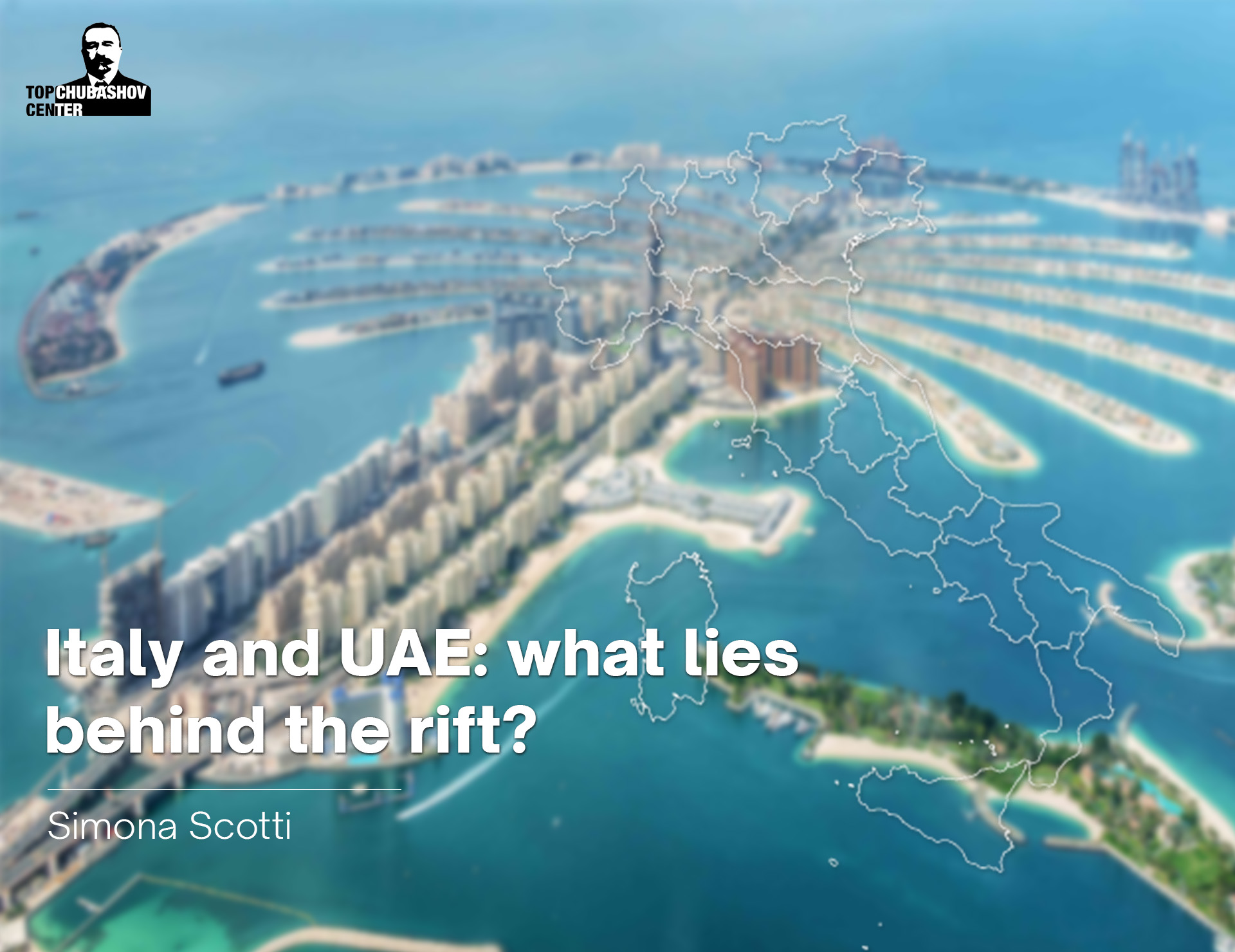Italy and UAE: what lies behind the rift?

Lately, the once excellent political-military relations between Italy and the United Arab Emirates have fallen to an all-time low. Italy and the UAE have been arguing over the future of the Italian airbase in al-Minhad after the Abu Dhabi government requested the withdrawal of Italian aircraft and personnel by the 2nd of July. The base has been used as a logistics hub for Italian operations in Afghanistan, Iraq and the Horn of Africa, and has recently supported the withdrawal of the Italian contingent from Herat after the end of Italy’s 20-year military mission. Thus far, Rome has deployed over 50 thousand soldiers intending to defeat the Taliban and initiate a process of stabilization, democratization and nation-building, and to train the Afghan army.
Moreover, at the beginning of June, the UAE denied transit to an official Italian flight bound for the flag-lowering ceremony in Afghanistan, where Italy's 20-year military mission ended. This decision was followed by the ultimatum for the withdrawal of Italian troops from their Forward Logistic Airbase in al-Minhad. Italy’s Minister of Defense Lorenzo Guerini specifies that 142 soldiers in force at the base in the Emirates vacated in a hurry after the eviction announced by the Abu Dhabi authorities. Accordingly, ‘79 were repatriated, 40 were deployed in Kuwait to ensure the emergency medical evacuation and tactical transport, while 23 remained in force at the transition coordination office located in Dubai’.
Abu Dhabi`s decision is to be considered as a retaliation for the blocking of Italian military export contracts to the Arab country. It was a kind of penalty by Rome for the Emirate conduct of the Yemen war as declared by Foreign Minister Luigi Di Maio: ‘We have a parliamentary resolution which by law obliges our officials to carry out this blockade. Until Parliament decides the opposite with a similar act, we will not be able to change this regime’. Yet, the cancellation of the already signed agreements for the sale of arms to the UAE to punish them for failing to respect human rights in Yemen clashes with the evidence on the ground, since the Emiratis have already largely emerged from the conflict two years ago.
The Emirati reaction stems from the outspoken pro-Americanism of the Italian government. Willing to recover credibility before Washington, from the end of 2020, therefore when Italy’s Prime Minister was still Giuseppe Conte, the Italian executive has been operating maneuvers that have only become more visible with Mario Draghi, current Prime Minister of Italy and former President of the European Central Bank; it ranges from the denunciation before the EU of the Sino-German investments agreement to the arrest of an Italian sailor who illegally shared documents with a Russian officer, up to Erdoğan defined as a ‘dictator’ by Mr. Draghi. The cancellation of the already signed agreements for the export of arms to the UAE is just another move in this direction. In late autumn 2020, the U.S. apparatuses began to criticize the Emirati behavior, in particular between Tripolitania and Cyrenaica and accused them of paying the Russian mercenaries of the Wagner Group and helping Moscow to penetrate North Africa. Washington feels irritated with Abu Dhabi's foreign policy, which is also showing increasing sympathies for China, especially after the decision to present itself as a provider of port services for the new silk routes.
Overall, the fierce geopolitical competition that Italy and the Emirates face in Libya is a major unspoken reason that led to the deterioration of their relations. While on the one hand Italy has established a well-known strategic partnership with Qatar and the Government of Tripoli, supported also by Turkey, on the other hand, the UAE in Libya supports General Haftar and is deployed on the opposite front of Qatar, which is perceived as the financial and media big cash of the Muslim Brotherhood. It is precisely the Qatari relationship with the Muslim Brotherhood that represents the core geopolitical question around which the tensions have soared. For the Emirates, the Muslim Brotherhood represents an ideological competitor. Abu Dhabi fears that their promotion of political activism, including support for elections, would be capable of questioning the political monopoly of Emir Al Nayan, which is based on hereditary legitimacy. Therefore, the threat of the Muslim Brotherhood must be addressed not only at home but also abroad, starting precisely from Libya where they are stronger. Abu Dhabi’s activism alongside General Haftar, supported with funding, military equipment and advisers, strongly collides with Italian interests and has contributed to the exacerbation of tensions between the two countries.
The negotiations between Rome and Abu Dhabi are still ongoing but they depict the kind of repercussions for a country that decides to subordinate its foreign and industrial policy to ideological initiatives. As a matter of fact, Italy is paying the consequences of using foreign policy to wage internal political battles, and the hostile attitude adopted by Abu Dhabi risks compromising Italy's position in an area that is crucial for its geo-economic interests. Indeed, Rome has always sought to derive significant economic and geopolitical benefits by adopting an equidistant attitude towards Middle Eastern actors and their cross rivalries. This has allowed Italian companies and their armed forces to be present in the intricate Middle East for decades. For this reason, it can not be excluded that the Emirati ultimatum and the consequent negotiations will also end up having repercussions on the Italian interests included in the vast region that from the Persian Gulf reaches the shores of North Africa.
The United Arab Emirates represents an important partner of Italy in all key sectors, especially in the political sphere, with a constant dialogue on security issues and the signing of a defense cooperation agreement in 2003. In the economic sphere, 600 Italian companies operate in the Emirates. In 2020, with 8.4 billion euros total trade turnover, Italy became the 8th trading partner of the UAE and the first among the EU Member States. With regards to exports, Italy rose from 11th to 9th place among the suppliers of the UAE.
With regards to exports, Italy rose from 11th to 9th place among the suppliers of the UAE. The latter is one of the most interesting actors not only in the Gulf but in the entire Islamic world and represents a fundamental interlocutor for the entire West. There is not a single dossier that does not see Abu Dhabi structurally contiguous to the interests of the West, including containment of Iran, in contrast to jihadist fundamentalism, freedom of maritime movement, and climate change.
While the decision to deny transit to the Italian plane will have no practical consequences, it announces a basic hostility that will probably have serious repercussions. As a matter of fact, the freezing of the bilateral relations between Italy and the Emirates is already having a negative impact on the economic and commercial exchange of the two countries, which risks compromising many orders and development opportunities. But even more serious for Italy is the risk of losing a precious ally in the Arabian Peninsula. The Emirates is the only Gulf country that has hosted a contingent of Italian soldiers and the country's first Catholic church is under construction, which is an innovative precedent for the entire Islamic world. Italy’s recent decision to partially loosen the arms embargo against the UAE will not be enough to mend the rift. The Italian government should get out of this impasse by giving new impetus to bilateral relations with Abu Dhabi and restore the full normality of bilateral relations between the two countries.







